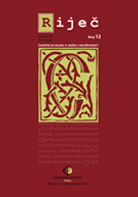EPSKI MODEL ROMANA U CRNOGORSKOJ KNJIŽEVNOSTI
EPIC NOVEL IN THE MONTENEGRIN LITERATURE
Author(s): Tatjana Đurišić-BečanovićSubject(s): Literary Texts
Published by: Filološki fakultet, Nikšić
Keywords: epic novel; narrative strategies; postcolonial discourse; identity; language of space; monumentality of characters; metatextuality; Montenegrin literature; collective memory
Summary/Abstract: The author of the article deals with narrative strategies, procedures and techniques on which the epic novels in Montenegrin literature have been based, as the oldest, but in the aesthetic sense, the weakest type of novel. The author will search in the meta textual connections, established between the epic type of the novel and the folk epic poem, which function as its key proto text, saturated by numerous (post) colonial ideologies, which will, particularly, be reflected in the axiological structure of the epic novel, or its ideological value point of view. In addition, the author will deal with the citation of the epic novel, which has been directed towards dialogues in the texts by Njegoš, especially those found in The Mountain Wreath, which have been seen as a treasure trove of identity information. The structure of the epic novel has been significantly influenced by the (post) colonial discourse, and in this context the romanesque space has been divided into two substructures that do not mutually interrupt and among which a sharp opposition has been established: our (Montenegrin, or Christian) (Turkish, or Islamic) space. The epic Montenegrin novel functions as a special mnemonic mechanism that preserves models of behavior, thinking and evaluation, as well as the narration about events of key importance for the survival and identity of the Montenegrin sociocultural community, hence its ideological and identity functions are more important than aesthetic ones.
Journal: Riječ
- Issue Year: 2015
- Issue No: 12
- Page Range: 29-45
- Page Count: 17
- Language: Serbian

